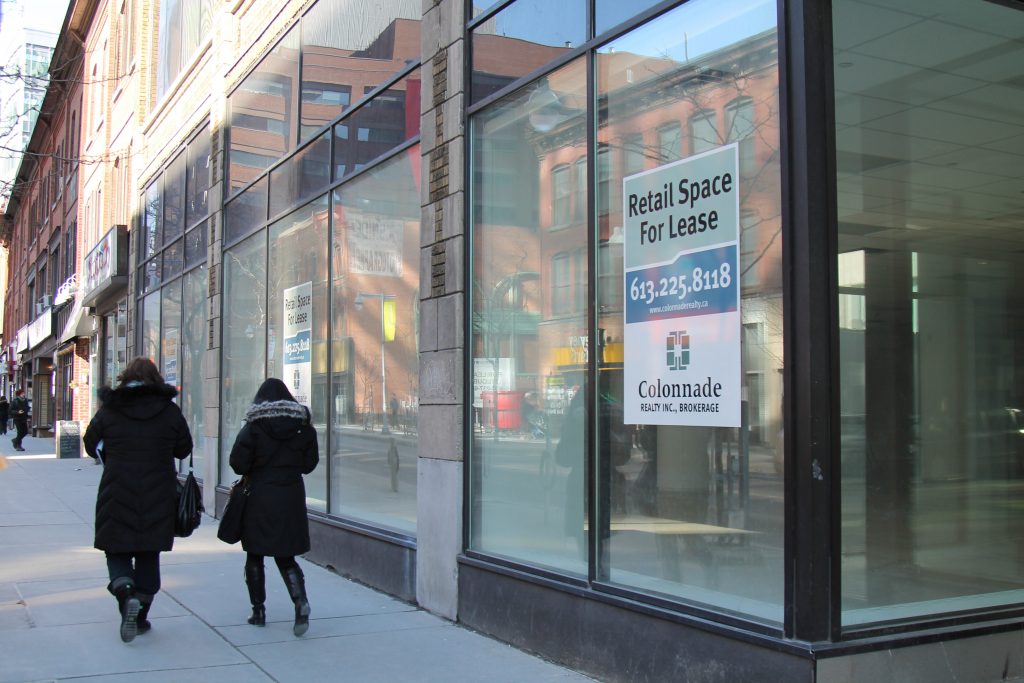City plan ‘hurts prosperity’: critic
By Michael Yang
Local landlords struggling to fill their vacant office and retail spaces in the downtown core may have to deal with one more headache come mid-summer.
According to deputy city treasurer Wendy Stephanson, the City of Ottawa will decide by July 1 whether to phase out its vacancy rebate program, which has provided a significant financial benefit to troubled landlords for more than 15 years.
The program, introduced by the province in 2001, allows property-owners to claim tax breaks on their commercial spaces through a rebate if they remain unoccupied for more than 90 days.
But while helpful for commercial owners who pay higher tax rates on their properties than their residential counterparts, Mayor Jim Watson and others have long complained the rebate incentivizes owners to forgo locking in long-term tenant contracts or performing necessary renovations until rent prices go up.
The sentiment comes as applications and refund costs have more than doubled over the past five years, eating into the city’s finances.
“It has definitely gotten to a point where it’s a significant chunk of money,” Stephanson said. “We were given flexibility by the province last fall to review the rebate and come up with something that best suits everyone’s needs.”
She said extensive consultations with local businesses and other stakeholders are taking place throughout this month.
However, the city has already outlined three possible routes for consideration: lowering the benefits, phasing out the program over three years or simply scrapping the rebate immediately.
Dora DiFrancescomarino, a manager at 20 Vic Management who participated in the consultations with the city, said the talks were far from two-sided.
“The city essentially gave us those three options and nothing else, not even a ‘none of the above’ option,” said DiFrancescomarino, who sits on the board of the Building Owners and Managers Association. “It’s a ridiculous notion that landowners would not try to fill their leases, especially given the soft market,” she continued.
“As a city, you’re trying to encourage business, and you then go and hurt prosperity because you can’t budget properly for something that’s been around for decades,”
She said owners and businesses proposed handing over business tax credits instead but the idea was rejected.
That spells bad news for property-owners downtown, who have watched in recent years as many tenants pack up and clear out to occupy newer, less expensive office space in the suburbs.
According to JLL Research, vacancy rates for downtown commercial spaces swelled to 10.2 per cent last year, adding 250,000 square feet to the downtown supply of empty office space.
“It’s no secret downtown landlords have scuffled since they were hit with a double whammy a few years back,” said Gillian Burnside, a commercial real estate agent at Avison Young.
She said one reason for their troubles is the continued mass “exodus” of public employees from downtown buildings as the government — Ottawa’s largest employer — has moved some workers out of the region and reduced hiring to cut costs.
Indeed, the government has vacated nearly one million square feet of downtown office space since 2010, including one massive move by the Department of National Defence into the former Nortel campus along Carling Avenue.
Another reason has been the government’s Workplace 2.0 Standards initiative, which lowered the minimum cubicle space required for public workers and recommended to private workers by about two square feet per person. That change has prompted a big drop in demand for space as employers focused on reducing their real estate footprint, said Burnside.
“If the city were to take away the rebate program, that would be another significant blow to landowners,” she said. “It’s an important lifeline to support owners when they lose an important tenant.”
On the flip side of the coin, the increasing cost of the rebate is taking its toll on city coffers.
In 2010, it refunded nearly $6 million for 711 properties, costing the city more than $9 million in total when interest and administrative costs are factored in. That number topped $13.5 million on 920 claims in 2015, costing the city more than $18 million.
Last year’s figures are still being totalled since building owners can continue to submit applications for a fiscal period through the following year.

